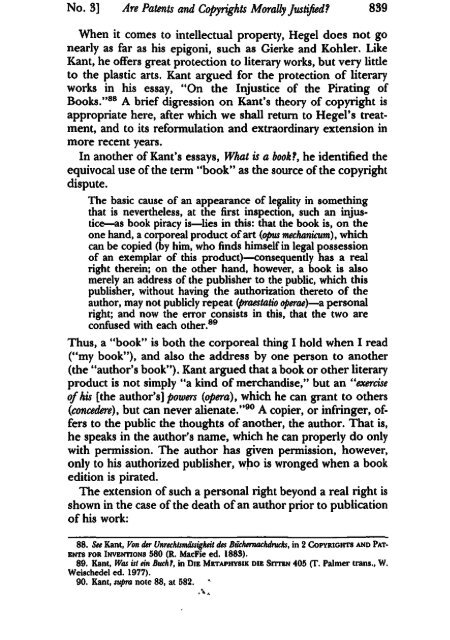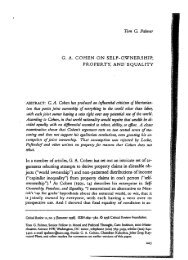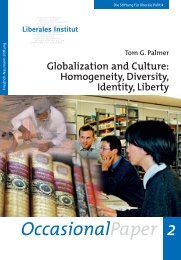Are Patents and Copyrights Morally Justified? - Tom G. Palmer
Are Patents and Copyrights Morally Justified? - Tom G. Palmer
Are Patents and Copyrights Morally Justified? - Tom G. Palmer
Create successful ePaper yourself
Turn your PDF publications into a flip-book with our unique Google optimized e-Paper software.
No. 3] <strong>Are</strong> <strong>Patents</strong> <strong>and</strong> <strong>Copyrights</strong> <strong>Morally</strong> <strong>Justified</strong>? 839<br />
When it comes to intellectual property, Hegel does not go<br />
nearly as far as his epigoni, such as Gierke <strong>and</strong> Kohler. Like<br />
Kant, he offers great protection to literary works, but very little<br />
to the plastic arts. Kant argued for the protection of literary<br />
works in his essay, “On the Injustice of the Pirating of<br />
Books.” 88 A brief digression on Kant’s theory of copyright is<br />
appropriate here, after which we shall return to Hegel’s treatment,<br />
<strong>and</strong> to its reformulation <strong>and</strong> extraordinary extension in<br />
more recent years.<br />
In another ofKant’s essays, What is a book?, he identified the<br />
equivocal use ofthe term “book” as the source ofthe copyright<br />
dispute.<br />
The basic cause of an appearance oflegality in something<br />
that is nevertheless, at the first inspection, such an injuslice—as<br />
book piracy is—lies in this: that the book is, on the<br />
one h<strong>and</strong>, a corporeal product ofart (opus nzechanicum), which<br />
can be copied (by him, who finds himself in legal possession<br />
of an exemplar of this product)—consequently has a real<br />
right therein; on the other h<strong>and</strong>, however, a book is also<br />
merely an address of the publisher to the public, which this<br />
publisher, without having the authorization thereto of the<br />
author, may not publicly repeat (praestatio operae)—a personal<br />
right; <strong>and</strong> now the error consists in this, that the two are<br />
confused with each other. 89<br />
Thus, a “book” is both the corporeal thing I hold when I read<br />
(“my book”), <strong>and</strong> also the address by one person to another<br />
(the “author’s book”). Kant argued that a book or other literary<br />
product is not simply “a kind ofmerch<strong>and</strong>ise,” but an “exercise<br />
ofhis [the author’s] powers (opera), which he can grant to others<br />
(concedere), but can never alienate.” 90 A copier, or infringer, offers<br />
to the public the thoughts ofanother, the author. That is,<br />
he speaks in the author’s name, which he can properly do only<br />
with permission. The author has given permission, however,<br />
only to his authorized publisher, who is wronged when a book<br />
edition is pirated.<br />
The extension of such a personal right beyond a real right is<br />
shown in the case of the death ofan author prior to publication<br />
ofhis work:<br />
88. See Kant, Von dee Unrechtsmdssigkeit des Bãehernachdnicks, in 2 COPYRIGHTS AND PAT-<br />
ENTS FOR INVENTIONs 580 (R. MacFie ed. 1888).<br />
89. Kant, Was itt an Bash?, in DIE MF.rAPnvsIx DIE SITFEN 405 (F. <strong>Palmer</strong>trans., W.<br />
Weischedel ed. 1977).<br />
90. Kant, supra note 88, at 582.











